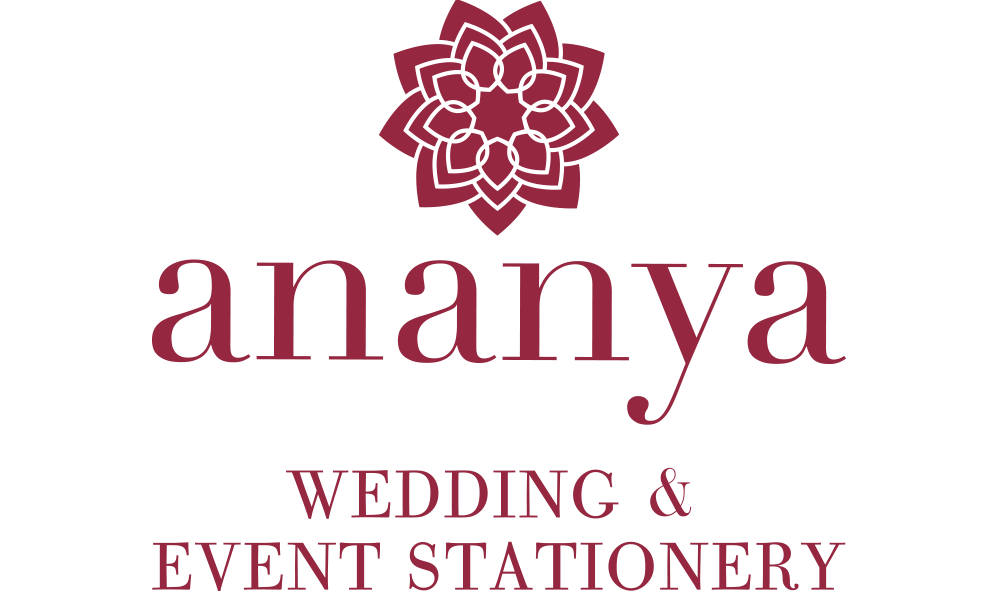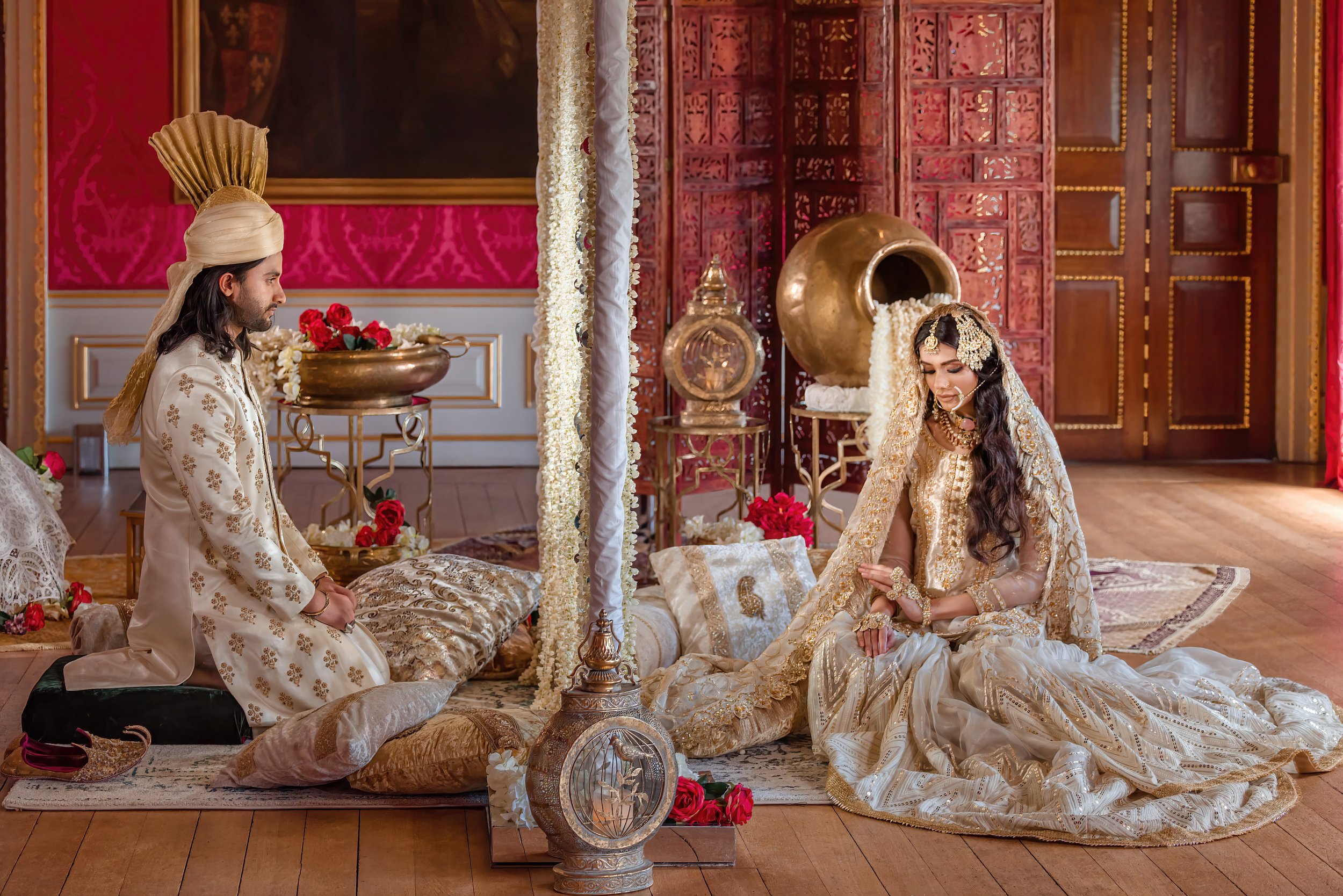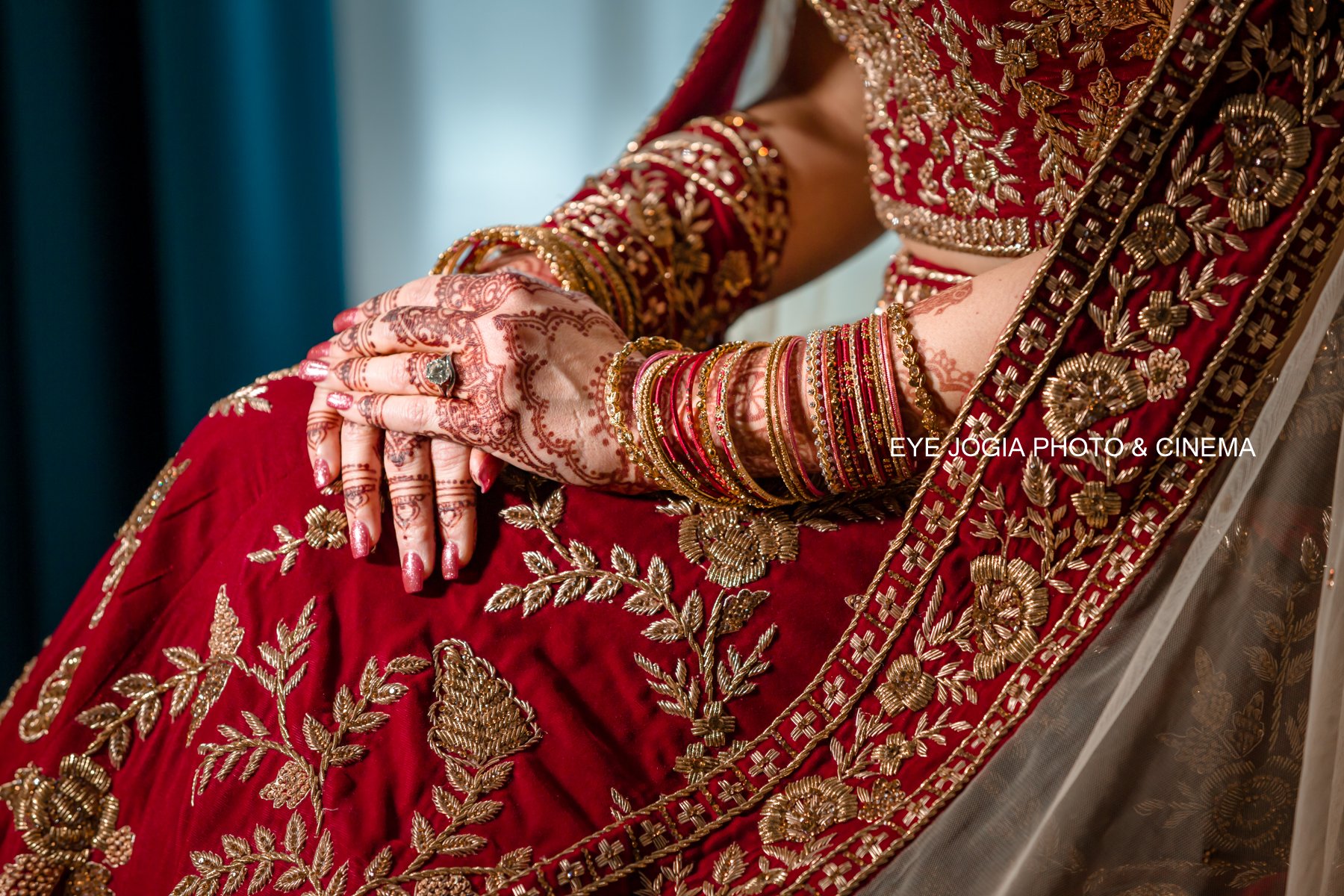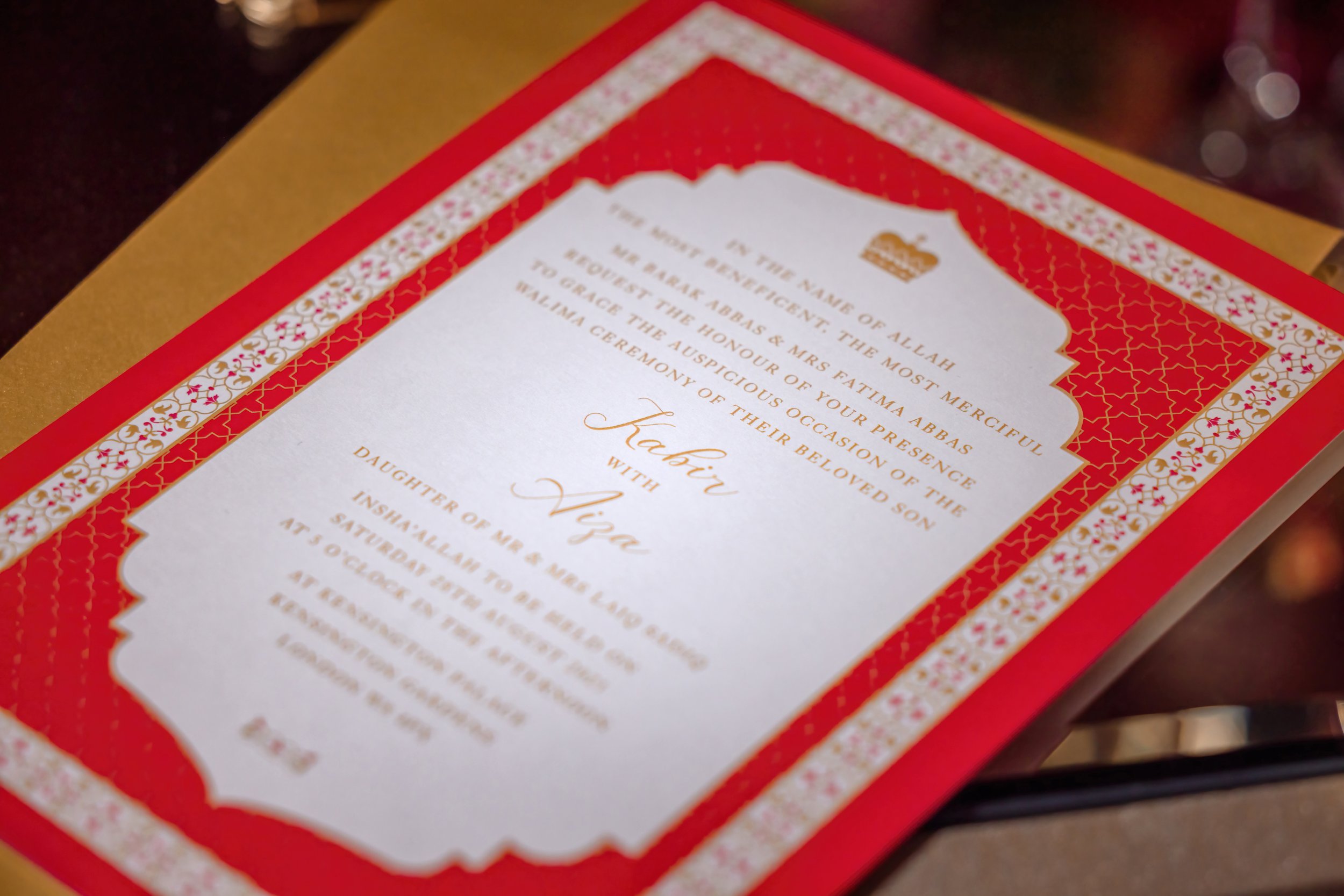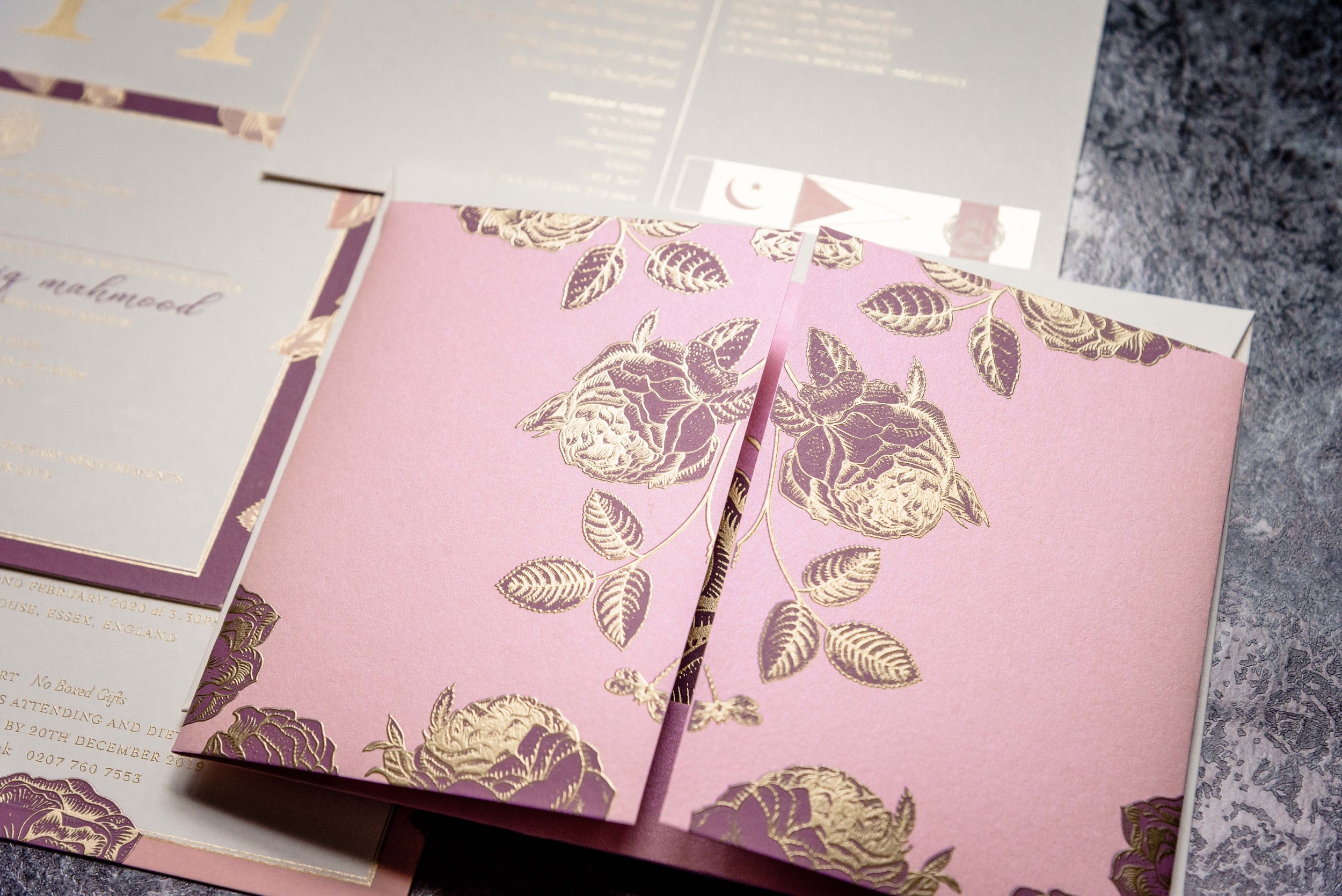Ananya has loved designing Islamic wedding stationery for over 15 years so we thought we would guide you through and explain the functions and events that are central to an Islamic wedding.
The Nikah ceremony at Kensington Palace. Photography by Eye Jogia
In this blog, we will focus on Islamic or Muslim weddings within a South Asian context (not all Islamic weddings are the same). Some of the events and ceremonies are the same or similar to other South Asian wedding events, while others are unique to the Muslim community.
Generally speaking, you can expect to attend at least one pre-wedding ceremony, one religious ceremony, and at least one reception or reception-like event. Pre-wedding events usually revolve around the ceremony called Mehndi (henna) and Haldi (turmeric). The Nikah ceremony is the religious wedding ceremony. Finally, the post-marriage events may include the reception and/or Walima (marriage banquet).
The two main pre-wedding ceremonies of Mehndi and Haldi may be combined or held separately, depending upon family preferences. Typically, the Mehndi ceremony is hosted by the bride’s side and might take place at home or a hall. It is usually for women who have mehndi applied on their hands in intricate patterns. The bride may have an elaborate and delicate design in which her husband-to-be’s initials are hidden somewhere within the pattern. Dress attire for this ceremony is generally semi-casual for guests (both Western and South Asian attire work). Since mehndi can get messy, it’s advisable to keep that in mind when choosing what to wear.
Intricate patterns of Mehndi from one of our multicultural weddings in London’s Mayfair captured by Eye Jogia
The Haldi ceremony (sometimes referred to as Manjha) is a fun event where family and friends take turns applying turmeric paste on the bride or groom. It is considered auspicious and a blessing to the couple. The ceremony is meant to be lighthearted and even messy and tends to be even more causal than the Mehndi event, so plan your attire accordingly. There is flexibility in terms of where the event can be held. It can be at the bride’s family home and only carried out by the bride, or both the bride and groom may participate in the same ceremony at the same venue/time. These variations are largely dependent upon family preferences and cultural differences.
Islamic wedding invitation by Ananya. Photography by Eye Jogia
The Nikah is the religious wedding ceremony. Where it is performed can vary. Some may choose to do it at a local Mosque/Masjid, while others may choose someone’s home or a venue. Typically, the Nikah is ordained by a religious figure or cleric (often referred to as a Maulvi or Maulana), and two Muslims who must act as witnesses to the marriage. At the beginning of the ceremony, the groom and his family will present a Mehr/Mahr (obligation) for the bride. Typically, this consists of a monetary gift, and is pre-agreed. The Maulvi will then recite a prayer from the Holy Quran before requesting consent to the marriage from the bride and groom. The Maulvi will first ask the bride if she agrees to the mehr and marriage. If she agrees and accepts, she will verbally express her acceptance of the marriage, three times in a row. For Bollywood fans, this is where the bride will say ‘Qubool Hai’ (I accept).
During this entire time, the bride and groom are expected to be in separate areas (although some families may choose to have both the bride and groom present in the same place). After receiving consent from the bride, the Maulvi will go to the groom and seek consent from him as well. Following the mutual acceptance from the bride and groom, the two will be brought together to sign the Nikahnama (the marriage contract), after which point the couple is considered religiously married. The Maulvi may choose to give a brief sermon following the officiating of the marriage. Generally, the Nikah process is short (around 30 minutes).
Muslim wedding invitations by Ananya. Photography by Hayley Gell Photography.
After the Nikah, the families will come together and host a Walima (marriage banquet). The Walima usually acts as the wedding reception, so this is the event where there will be dinner, opportunities to congratulate the couple, take pictures with them and present gifts. As certain practices like drinking alcohol are forbidden in Islam, guests should expect an alcohol-free event. Depending upon how religious the families are, there may or may not be entertainment, including dancing. At the end of the Walima, there will be a procession to see the bride and groom off to start their married life and their happy ever after.
The Haldi, Mehndi, Nikah and Walima illustrate the core aspects of a South Asian Muslim wedding. There may be some more intimate and detailed rituals that happen, but those are largely reserved for immediate family members.
Islamic wedding invitations by Ananya. Photography by Hayley Gell Photography.
We hope you have enjoyed this guide to Islamic weddings and that you have gained some valuable information on the ceremonies and proceedings. We take pride in creating meaningful and memorable stationery for cultural weddings.
At Ananya, we have been designing beautiful, personalised wedding stationery for Muslim weddings for over 15 years. Whether it’s for the Nikah, Haldi, Mehndi, Walima or other functions, we tell your love story by infusing your personality and style into your wedding stationery in the most elegant and memorable way!
Allow us to show you how we can personalise your wedding stationery. Do get in touch and let’s arrange your stationery consultation.
Until next time,
